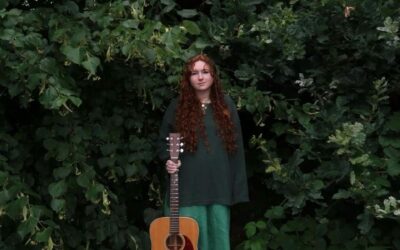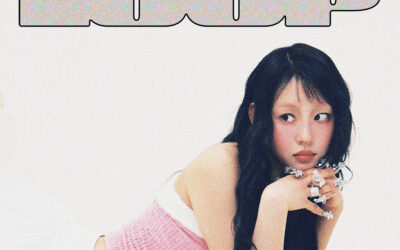Discover the Hong Kong-born singer-songwriter navigating through life, being honest about her music and advocating for diversity, inclusion, and women in tech.
Hearing the steady beeps that accompany waiting at a pedestrian red light, eventually changing into rapid beeps in sets of four, Joya demanded her time for 5678 while dashing to an event in Causeway Bay, Hong Kong. The queer, Asian, Hong Kong singer-songwriter has been a busy woman since her breakout performance at the closing ceremony of the Hong Kong-hosted 2023 Gay Games. She was excited about heading to Singapore tomorrow.
As she dashes over the road, she tells 5678 it was a fluke, “I was asked to join the closing ceremony relatively last minute, just a week before. One of my shows with another artist called Darkwah was something that we decided on the day I met him.
They taught me the course of the song for the collaborative set about an hour before the actual show, and then I went on stage with them.”
Born and raised in Hong Kong, 30-year-old Joya, real name Jodie Chan, is an Indie-Pop artist. She has performed publicly since she was nine and started writing music when she was 12. However, it wasn’t until 2020 that she released her own music publicly on platforms such as Spotify and Apple Music.
“I feel at home when performing, and it feels like something that I’ve been made to do.”
Years later, Joya studied political science and global health, which were surprisingly unrelated to music, at Northwestern University in the US. It seemed to her that music was a hobby rather than a stable profession.
Continuing to pursue her many interests, she returned to Hong Kong in 2016 to work in the tech scene. Joya is now leading a product team and essentially helping launch different software products as her premise. She works as a full-time tech in the daytime and writes music in her spare time. Balancing her passion for music and her career in tech, she proves that one can strive for multiple interests simultaneously. “I’ve found my own way to navigate my many interests,” she says. “People often think you have to pick one over the other, but right now, I find a way that works for me.”
Working as a tech and an artist, “I kind of think about them the same way because growing music is like growing a company. I am the artist therefore I am the product. I can think about it that way in marketing.”
Gay Games fame came for Joya after she began to put out singles online in 2020. Three years later, the indie-pop singer released her debut EP, “She is Joya”. She is being selected to be Spotify’s RADAR artist in 2024. She defines her music as “lyric-focused” and “writing small songs for big feelings”.
“I have some upbeat and intimate songs. But in general, I try to keep myself very honest. In terms of the content, there are different places for upbeat or slow music, but I try to make each word that I put into my song meaningful,” she says.
Joya weaves a world, pulling in a broad range of influences, such as Ben Platt, Sigrid, and Bruno Major, to create an Indie Pop sound of her own. Inspired by the book Tomorrow and Tomorrow and Tomorrow by Gabrielle Zevin, she released her latest song, “In Between”. This heartbreak song features a melancholic tune that reflects the experience of feeling played and not having a clear definition of the relationship.
“When I’m writing, I try not to limit it to my personal experience only,” she says. “I get inspiration from watching movies or reading books. I can pull back from experiences of heartbreak or pain, but I also draw inspiration imagining these fictionalised characters.”

Hong Kong might not be the most LGBTQ+-friendly city, given that neither same-sex marriage nor civil partnerships are recognised by the Law of Hong Kong. Despite the Hong Kong government’s conservative stance on LGBTQ+ rights, she identifies herself as queer and has fearlessly advocated for diversity and inclusion. “Coming out is a very scary thing for anybody,” she admits. “For me, it was really challenging coming from a Christian upbringing and having many friends who were in that church environment.”
“It was important to come out to the people who mattered the most to me. I’m so grateful that my parents were supportive and are still supportive because I felt stabilised in them. They are my immediate support circle, and I feel safer and even more open with the rest of the world.”
“Sometimes the beauty of being in a place with many people, culture, and internationalism is that you can find where you belong even if they’re not around you.”
When asked about inclusivity in Hong Kong, Joya points out that there are always ongoing areas for improvement, not just with the LGBTQ+ community but also with people being treated in general. “It’s a privilege to be able to come out,” she says. “A lot of people can’t come out because they might get kicked out by their families; they might be bullied. I’m a strong believer that you take the time you need, but make sure you’re doing something healthy for you.
“A huge wealth disparity and economic racism are struggles that exist in Hong Kong, along with LGBTQ+ issues,” she added.
After becoming an independent artist, she does not realise a significant change in her life. She describes herself as a ‘day person’ whilst being extremely active in water sports, running, and hiking. One thing she finds interesting is that some people that she’s met had come through purely seeing her online.
Joya said: “The impact I could see was so big and inspiring that someone I’d never met would hear some of my work and be inspired, supported, and encouraged.
The other aspect is the voice and impact that you can have. When I’m performing, it’s one person versus a thousand. I want to continually be a better person and help someone else.”
In a world where voices often struggle to be heard above the cacophony of modern life, Joya’s music is a blend of love and harmony.
Right now, the work might fall for Joya and her shows, mainly in Singapore and Hong Kong. She is also working on several new songs, with her first dance song, “Confetti”, coming out on May 24. Entering Pride Month, she will participate in Pride-related activities, and speak on diversity and inclusion panels.
“The biggest change is how I view myself and the things that I can do, and to always stay humble and always work hard.”
Article credit: Elim Lau
Edited by: Mia Rose




